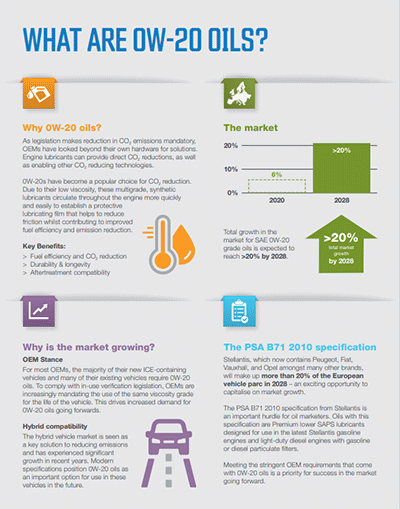Feb 21, 2024
Posted by Mathew Cole-Evans, Technical Manager
Evolution of 0W-20
Europe has strict targets for CO2 reduction across the vehicle fleet. By 2025, the fleet must reduce CO2 by 15% and by 2030 the fleet must reduce CO2 by 55% (compared to 2021).
As the automotive industry strives for reduced CO2 (and therefore improved fuel economy), Original Equipment Manufacturers (OEMs) have looked to engine oil as a key component to help their progress. Engine oil viscosity has long been recognized as a key driver for fuel economy. This has led all major European passenger car OEMs to introduce engine oil specifications which cover the SAE 0W-20 viscosity grade, which reduce friction compared to higher viscosity grades (like SAE 5W-30, for example), leading to improved fuel economy. Although the key driver behind SAE 0W-20 engine oils is to improve fuel economy, these formulations must continue to provide the same level of protection against wear and deposits as higher viscosity grade engine oils.

In the past, OEMs often specified multiple engine oil specifications and/or viscosity grades for use in vehicles. It was not uncommon for a new vehicle to leave the factory with a 0W-20 engine oil, only to have higher viscosity grades added during routine service for the remainder of the vehicle’s life. However, Europe is introducing “In-Use Verification” rules, which require that the vehicle’s CO2 and emissions performance must comply for the whole vehicle life. This means that OEMs have now transitioned to specifying a single engine oil specification and viscosity grade for servicing. This means that any new vehicles leaving the factory with a 0W-20 engine oil are much more likely to continue using 0W-20 engine oils for life.
Another market driver is compatibility with hybrid vehicles. The hybrid vehicle market is seen as a key solution for OEMs to reduce their CO2 emissions and has therefore experienced significant growth in recent years. In their latest generation of hybrid ICE vehicles, most OEMs are now requiring SAE 0W-20 engine oils to further reduce their CO2 emissions. To minimize complexity in their workshops and supply chains, OEMs want to avoid creating more specifications and are therefore using the same engine oil specifications in both conventional and hybrid ICE vehicles. In some cases, new tests have been added to their engine oil specifications to ensure additional protection for hybrid ICE.
PSA B71 2010 Specification
Stellantis, the OEM which includes European brands like Peugeot, Citroen, DS, Fiat, Vauxhall, and Opel, accounts for more than 20% of the European vehicle parc. This makes coverage of the Stellantis PSA B71 2010 specification vital to ensure success in the market.
PSA B71 2010 is a complex specification, combining a mixture of critical engine and laboratory tests which assess a range of different performance requirements. This ensures that the lubricant delivers the strong fuel economy performance, provides protection against deposits, wear, and LSPI. It also ensures the lubricant is compatible with the different elastomers and fuels in use in these engines. The complexity of achieving the PSA B71 2010 specification demonstrates the importance that Stellantis continues to place on this highly demanding specification. An OEM-Approved PSA B71 2010 lubricant ensures the correct level of performance and protection for the engine.
Takeaway: Start with, Stay with the Right Oil
Choosing the right specification of engine oil plays a key role in ensuring optimal performance and longevity for your vehicle. Using OEM-approved engine oils to the correct specification for the entire life of the vehicle is the way to ensure the engine is properly protected and that the correct fuel economy performance is retained.









